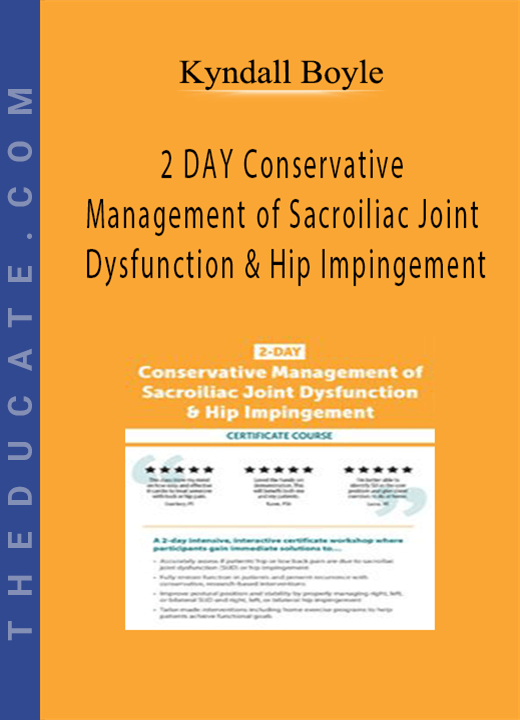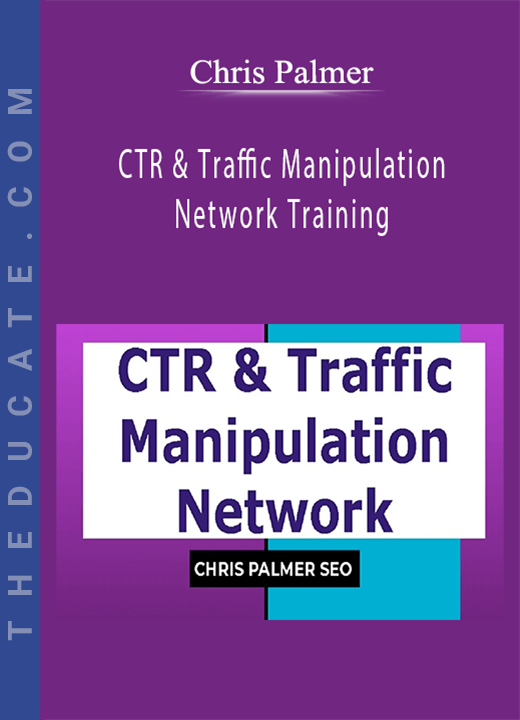Description
2 DAY: Conservative Management of Sacroiliac Joint Dysfunction & Hip Impingement – Kyndall Boyle
The National Institutes of Health states that millions of Americans spend at least $50 billion a year to alleviate the stress and discomfort in their low back. A common, yet enigmatic cause of this debilitating pain is the malalignment of the sacroiliac joint (SIJ). At first glance, however, many rehab professionals and even surgeons believe other back and hip injuries, such as facet-joint syndrome or a bulging disc, are the reasons for the pain. X-rays, MRIs, and even CT scans might show narrowing spinal discs or other possible factors producing the problem; yet these tests have minimal benefit because they oftentimes fail to show the exact source of the client’s pain.
It is important to accurately identify and diagnose pain from the SIJ’s and pain from hip impingement. Medical professionals may misdiagnose the problem and intervention may be unsuccessful. In some cases, surgery is performed unnecessarily. In order to help restore and prevent future pain in patients, rehab professionals need the proper tools to accurately identify both SIJD and Hip Impingement to manage them appropriately.
In this comprehensive online program, participants gain the tools to assess and treat patients with SIJD and/or hip impingement. Kyndall Boyle, PT, PhD, OCS, PRC, who has nearly 25 years of experience as a clinician and researcher, shares the latest evidence in the field, along with rationale for conservative intervention. She discusses relevant anatomy and biomechanics, including issues of bilateral and unilateral instability and postural asymmetry, as well as examines the relationship between SIJD and hip impingement, and the relationship between SIJD, suboptimal respiration, posture, and motor control.
You’ll immediately take home the knowledge needed to assess and treat SIJD by examining a case study, case series, and a randomized controlled trial. During the interactive lab portion of the class, participants expand their hands-on skills by watching demonstrational therapeutic exercises to manage SIJD and hip impingement.
- Recognize faulty posture and strategies to oppose it
- Define hip mechanics in order to correctly oppose faulty posture and to optimize muscle contractions
- Identify muscles to active and to inhibit to reposition the body from a suboptimal position to a more optimal position
- Recognize subjective and objective data associated with a diagnosis of SIJD and/or Hip Impingement
- Explain the anatomy and biomechanics related to SIJD and Hip Impingement, including asymmetrical and symmetrical postural patterns
- Analyze conservative evidence-based interventions used to manage patients with SIJD and Hip Impingement
- Explain the important relationships between faulty respiration, posture, motor control, and SIJD
- Analyze evidence based conservative interventions used to manage patients with SIJD and/or hip impingement
- Evaluate the rationale for therapeutic activities and neuromuscular re-education that could be used to address asymmetries/pathomechanics related to SIJD and/or hip impingement
- Demonstrate evidence-based tests and measures to determine the appropriate diagnosis of SIJD or hip impingement
- Demonstrate therapeutic activities/neuromuscular re-education to manage a patient with SIJD
- Demonstrate therapeutic activities/neuromuscular re-education to manage a patient with Hip Impingement
SACROILIAC JOINT DYSFUNCTION (SIJD): HOW TO EXAMINE AND IDENTIFY
- Terminology and prevalence
- Signs and symptoms suggesting SIJD
- Examination tests and measures to identify SIJD
- Examination tests and measures to identify postural patterns
ANATOMY AND BIOMECHANICS OF SIJD
- Relationship between faulty respiration, posture, motor control, and SIJD
- Right vs. left SIJ movement
- Relationship between hips and SIJ
- Human asymmetry/movement patterns and the influence on SIJD
CONSERVATIVE INTERVENTIONS USED TO MANAGE SIJD
- Current research/literature evidence
- Case study
- Case series
- Randomized control trial
- Clinical suggestion
- Book chapter
HANDS-ON LAB/DEMONSTRATION
- Demonstration/Lab practice of examination tests and measures
- Demonstration/Lab practice of therapeutic exercises for right SIJD
- Demonstration/Lab practice of therapeutic exercises for left SIJD
- Demonstration/Lab practice of therapeutic exercises for symmetrical postural pattern (bilateral or unilateral SIJD)
HIP IMPINGEMENT: HOW TO EXAMINE AND IDENTIFY
- Terminology and prevalence
- Signs and symptoms suggesting hip impingement
- Examination tests and measures to identify hip impingement
- Examination tests and measures to identify postural patterns
ANATOMY AND BIOMECHANICS OF HIP IMPINGEMENT
- Relationship between SIJD and hip impingement
- Relationship between faulty respiration, posture, motor control, and SIJD
- Right vs. left SIJ movement
- Human asymmetry/movement patterns and the influence on hip impingement
CONSERVATIVE INTERVENTIONS USED TO MANAGE HIP IMPINGEMENT
- Current research/literature evidence
- Case study
- Case series
- Randomized control trial
- Clinical suggestion
- Book chapter
- HANDS-ON LAB/DEMONSTRATION
- Demonstration/Lab practice of examination tests and measures
- Demonstration/Lab practice of therapeutic exercises for hip impingement
- Demonstration/Lab practice of therapeutic exercises for symmetrical postural pattern
Tag: 2 DAY: Conservative Management of Sacroiliac Joint Dysfunction & Hip Impingement – Kyndall Boyle Review. 2 DAY: Conservative Management of Sacroiliac Joint Dysfunction & Hip Impingement – Kyndall Boyle download. 2 DAY: Conservative Management of Sacroiliac Joint Dysfunction & Hip Impingement – Kyndall Boyle discount







7 reviews for 2 DAY: Conservative Management of Sacroiliac Joint Dysfunction & Hip Impingement – Kyndall Boyle
There are no reviews yet.